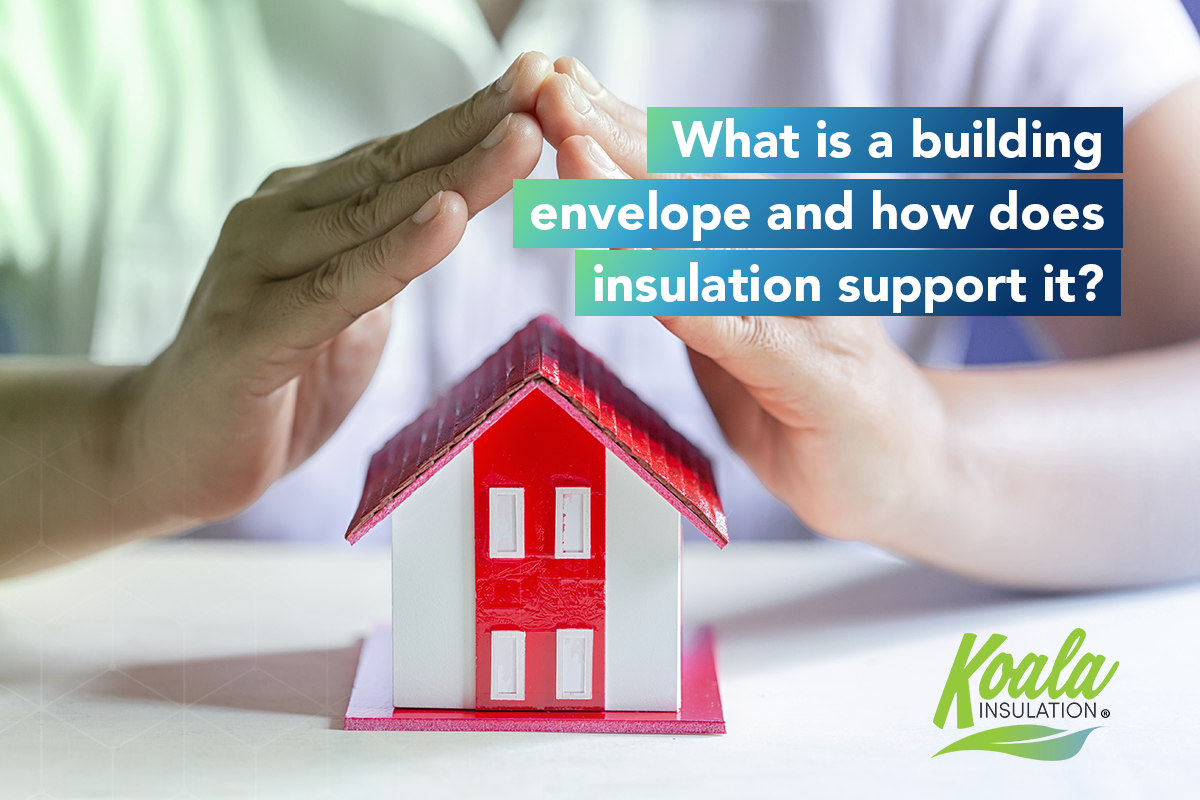What is a building envelope and how does insulation support it?


If you’ve done some research into insulation or if you’ve looked into doing some work around your home, you’ve surely come across the term “building envelope” at some point. Insulation is a key element in any building envelope. It provides support against external forces, controls the exchange of water, condensation, air and heat between the inside and outside of your home, and provides an aesthetic finish. Without insulation, your building envelope would be incomplete. In general, the building envelope combines structural integrity, moisture control, temperature control and air pressure boundaries into one system that serves as a physical separator between the conditioned and unconditioned environment of your home. That physical separator usually consists of the foundation, roof, walls, doors, windows, ceiling, and their related barriers and insulation.
A building envelope serves many functions which can be divided into three main categories:
- Support: your building envelope provides support for your home against external forces.
- Control: The envelope controls the exchange of water, condensation, air and heat between the inside and outside of your home.
- Finish: Your building envelope provides the aesthetic exterior of your home.
Tight vs. loose building envelopes
Building envelopes are often categorized into “tight” or “loose”. A loose building envelope allows more natural air transfer which can take the place of mechanical ventilation. However, loose buildings are usually more drafty and uncomfortable as their temperatures are more difficult to regulate and more heat & humidity can enter.
A tight building envelope is essential in controlling the indoor environment and maintaining comfortable temperatures as air transfer is minimized, which helps to keep energy costs down and allows for more control over your indoor air quality, temperature, humidity levels and your energy consumption, but will need more extensive mechanical ventilation. This tighter envelope is created by insulation, caulk, sealants and energy-efficient windows that keep out the heat and humidity and therefore prolong the life of the building components.
A well-sealed and insulated building envelope is especially important in hot, humid climates like Florida. The less air that is able to enter the home, the easier it is to keep cool in the summer months. Additionally, air sealing the building envelope can help to prevent moisture from entering the home, which reduces the risk of mold and mildew growth.
Insulation as part of your building envelope
As mentioned above, insulation is an integral part of your building envelope. Without insulation, the building envelope is unable to control the temperature or moisture levels within the home, leading to an uncomfortable and potentially unsafe living environment. Insulation works by creating a barrier between the inside and outside of the home, keeping cool air inside during summer (or all year round in South Miami!). This helps to even out the temperature inside your home, making it more comfortable. In addition to insulation's temperature-control benefits, it also inhibits moisture from entering the home, which can cause mold and mildew growth. By keeping the building envelope dry, insulation helps to keep your home safe and healthy.
You could therefore say that non- or under-insulated homes (so nearly 90% of homes in the US) are not efficiently protecting the inside of their home from the outside. In order to have a comfortable, energy-efficient home where the cooling sources are not constantly fighting the exterior elements making their way inside the house, insulation and air sealing are two key steps in creating a good thermal building envelope.
The extra layer of foam, loose-fill or batt insulation creates a thermal barrier between your air-conditioned space that, with the right R-value, will effectively keep the heat out of your attic and therefore out of your living space which means that your A/C won’t have to run as much. As a result, you will be saving money on your energy bills. If you’re not sure what type or R-value of insulation is right for your home, consult Koala Insulation of South Miami. We can help you determine which areas of your home need more insulation and recommend the best type of insulation for your needs.
Insulation does not only act as part of the thermal building envelope but also offers other benefits:
Insulation for better indoor air quality
One of the most important functions of insulation is to act as a barrier against air pollutants, allergens and insects. By keeping these unwanted elements out of your home, you can significantly reduce the risk of illness and disease for your family. Additionally, insulation can also help to keep humidity levels low, which reduces the risk of mold and mildew growth. This is especially important in areas where these substances are known to flourish, such as basements or attics. In combination with air sealing, insulation provides an additional layer of protection against these potentially harmful growths.
Insulation for better structural integrity
Especially closed-cell spray foam insulation is an excellent choice for reinforcing the exterior walls and stud cavities of your home. The material's density and rigidity create a stable surface that is much stronger than non-insulated walls or other insulation materials. In fact, research conducted by the National Association of Home Builders has shown that closed-cell spray foam walls have a racking strength up to 300% greater than walls without it. This makes closed-cell spray foam a great option for homes in areas with high winds or other weather conditions that can cause damage to traditional insulation materials.That means that walls with closed-cell spray foam offer more protection against outside forces like hurricanes and other natural disasters.
Get thermal and structural protection for your home by giving Koala Insulation of South Miami a call today!
Find Your Location


Get a quote



